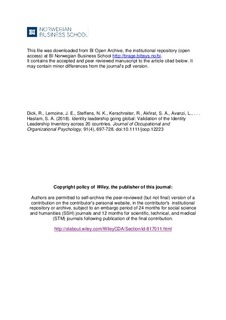Identity Leadership Going Global: Validation of the Identity Leadership Inventory (ILI) across 20 Countries
Van Dick, Rolf; Lemoine, Jérémy E; Steffens, Niklas K.; Kerschreiter, Rudolf; Akfirat, Serap Arslan; Avanzi, Lorenzo; Dumont, K; Epitropaki, Olga; Fransen, Katrien; Giessner, Steffen Robert; González, Roberto; Kark, Ronit; Lipponen, Jukka; Markovits, Yannis; Monzani, Lucas; Orosz, Gábor; Pandey, Diwakar; Roland-Levy, Christine; Schuh, Sebastian C; Sekiguchi, Tomoki; Song, Lynda Jiwen; Stouten, Jeroen; Tatachari, Srinivasan; Valdenegro, Daniel; van Bunderen, Lisanne; Voros, Viktor; Wong, Sut I; Zhang, Xin-an; Haslam, Alexander
Journal article, Peer reviewed
Accepted version
Permanent lenke
http://hdl.handle.net/11250/2573399Utgivelsesdato
2018Metadata
Vis full innførselSamlinger
- Publikasjoner fra CRIStin - BI [1015]
- Scientific articles [2181]
Sammendrag
Recent theorizing applying the social identity approach to leadership proposes a four‐dimensional model of identity leadership that centres on leaders’ management of a shared sense of ‘we’ and ‘us’. This research validates a scale assessing this model – the Identity Leadership Inventory (ILI). We present results from an international project with data from all six continents and from more than 20 countries/regions with 5,290 participants. The ILI was translated (using back‐translation methods) into 13 different languages (available in the Appendix S1) and used along with measures of other leadership constructs (i.e., leader–member exchange [LMX], transformational leadership, and authentic leadership) as well as employee attitudes and (self‐reported) behaviours – namely identification, trust in the leader, job satisfaction, innovative work behaviour, organizational citizenship behaviour, and burnout. Results provide consistent support for the construct, discriminant, and criterion validity of the ILI across countries. We show that the four dimensions of identity leadership are distinguishable and that they relate to important work‐related attitudes and behaviours above and beyond other leadership constructs. Finally, we also validate a short form of the ILI, noting that is likely to have particular utility in applied contexts.
Practitioner points
The Identity Leadership Inventory (ILI) has a consistent factor structure and high predictive value across 20 countries and can thus be used to assess a leader's ability to manage (team and organizational) identities in a range of national and cultural contexts.
Identity leadership as perceived by employees is uniquely related to important indicators of leadership effectiveness including employees’ relationship to their team (identification and perceived team support), well‐being (job satisfaction and reduced burnout), and performance (citizenship and innovative behaviour at work).
The ILI can be used in practical settings to assess and develop leadership, for instance, in 360‐degree feedback systems.
The short form of the ILI is also a valid assessment of identity leadership, and this is likely to be useful in a range of applied contexts (e.g., those where there is a premium on cost and time or when comparing multiple leaders or multiple time points).

